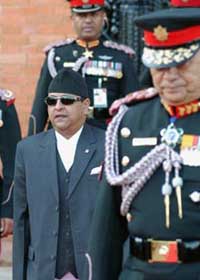Nepal's prime minister, Cabinet, staff get hepatitis at key juncture of peace process
Nepal's 84-year-old prime minister, six members of his Cabinet and 25 staff at his residence have fallen ill with hepatitis E, doctors and officials said Wednesday.

The outbreak of the food- and waterborne illness has come at a crucial point in Nepal's peace process aimed at ending a decade-old Maoist insurgency.
Prime Minister Girija Prasad Koirala's doctor said though he was resting at his official residence, he "continues to fulfill his responsibilities of national importance unabated."
Although hepatitis E in not usually fatal, it's symptoms can impair the ability to work until the illness goes away on its own, over weeks or months.
The prime minister's health is being monitored, said his doctor, Madhu Ghimire.
Pradeep Gyawali, one of the ministers to fall sick, said he and many of his colleagues believe the food and water they ate and drank at the prime minister's house during meetings spread the disease.
Koirala was appointed prime minister last year after weeks of pro-democracy demonstrations forced King Gyanendra to give up authoritarian rule and reinstate Parliament.
Koirala led the protests and was joined by six other main political parties. He was supported by Maoist rebels who at that time were fighting against government troops.
He is also credited with persuading the Maoists to give up their armed revolt, sign a peace accord and join mainstream politics.
The Health Ministry issued a notice on Wednesday warning people in the capital to be careful of what they consume. The notice said the disease has spread in Katmandu and precautions can be taken by drinking boiled water and eating clean food, reports AP.
Hepatitis E is spread by food or water that has been contaminated by the feces of an infected person.
Symptoms include jaundice, fatigue, abdominal pain, loss of appetite, nausea, vomiting, diarrhea, a low fever and headache.
Subscribe to Pravda.Ru Telegram channel, Facebook, RSS!





